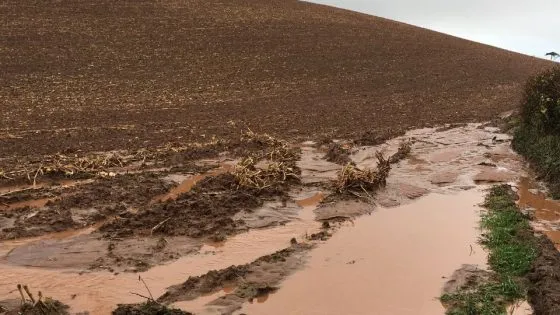A lack of soil health in Europe and the UK is causing faster rainfall runoff and higher flood risk, according to research conducted by climate action group.
The new report by Conscious Planet, Soil and Water: Unravelling the Nexus, reveals that 61% of Europe’s soils are unhealthy, reducing their capacity to absorb rainfall.
In the UK, this diminished absorption leads to faster rainfall runoff and higher flood risk, at a crucial time when the quantity of extreme weather events is increasing and water companies are under huge amounts of pressure to replace an ageing infrastructure system.
Save Soil, a subsidiary of Conscious Planet, conducted the analysis that explains how degraded or compacted soils lead directly to increased surface runoff during heavy rain, significantly exacerbating flooding. This is a major issue across Europe, where floods now account for 85% of recent weather-related financial damages, amounting to more than £15bn.
The analysis discusses how tackling soil degradation is not just an environmental necessity but “a paramount priority for effective water resource management and climate change mitigation.”
It states: “By urgently prioritising the restoration of soil health, the UK and wider Europe can build critical resilience against escalating water scarcity, devastating droughts and catastrophic floods, safeguarding environmental and food security before it’s too late.”
In October last year, the Environment Agency issued a statement stating it was concerned about the impact heavy and prolonged rainfall is having on farmland in Devon and Cornwall, especially in areas with steep slopes.
Late harvesting of crops like maize ahead of winter can leave bare, compacted land. Heavy rain in these conditions means runoff will erode soil, pollute watercourses and flood roads and neighbouring properties.
Environment Agency project manager James Wimpress said at the time: @Farming is tough right now. A very wet year is already delaying harvest time for some farmers and making conditions for harvest very difficult. This will compound the problems winter brings.
“The longer that harvest is delayed, the smaller the window is to plant any form of cover crop to bind the soil and reduce runoff and cultivate the ground to reduce compaction.
“Winters are only going to get tougher with more rain for longer periods. This means more soil erosion, runoff, pollution and flooding, unless farming practices become more resilient.”
Save Soil is urging the UK government to support farmers in restoring soil health, not only to reduce flooding but to protect water and food security as the impacts of climate change continue to increase.
Techniques including cover cropping (the practice of planting legumes or grasses) and tilling soils less could increase its absorption rates and health.
Save Soil chief technical officer Praveena Sridhar said: “Improving soil health is key for the UK’s water management.
“Healthy soil, rich in organic matter, acts like a natural sponge, increasing water infiltration (organic matter can hold up to 10x its weight in water) and reducing damaging runoff.
“Practices like reduced tillage and cover cropping are highlighted as ways to enhance soil structure and absorption capacity.
“Prioritising soil health is crucial for the UK’s water resources, adapting to climate change and securing food production.
“We urge the national government to provide additional support to farmers in raising their soil organic matter. This will ensure water and food security for generations to come.”
Like what you’ve read? To receive New Civil Engineer’s daily and weekly newsletters click here.

